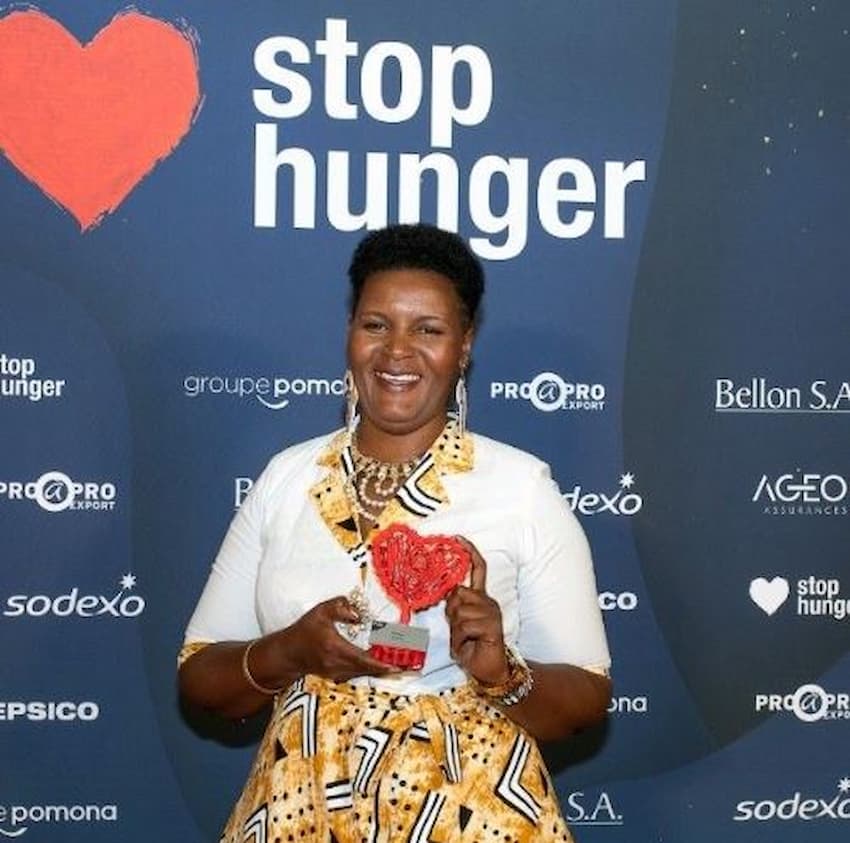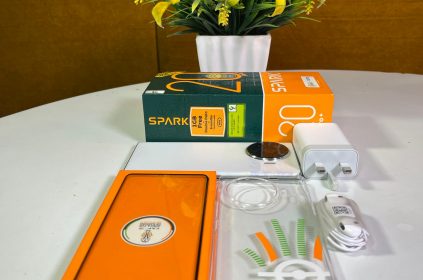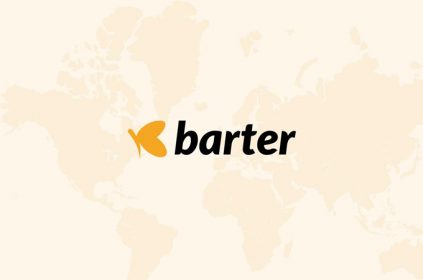Doreen Irungu isn’t your typical female tech founder with Ivy League education, international work experience with several multinationals all over the world and international exposure prior to founding Ustawi Afrika.
She describes herself as woman who grew up watching her mother and several other women farm without being able to own land in rural Kenya.
This childhood experience would form the basis of Doreen’s inspiration to founding her agritech startup, Ustawi Africa, Ustawi being a Swahili word for Wellness.
On this edition of women in tech, I speak with Doreen Irungu, founder Ustawi Africa, the 2021 and 2023 Laurette Winner for Women in Africa and Stop Hunger Bussiness Award Winner, on how her childhood experience in rural Kenya inspired her to create a solution that enables families, especially women farmers in rural areas have the training, technological equipment, access to funding and a market for their products.
How it started
Growing up in rural Kenya didn’t stop Irungu from aspiring to the best education possible. She holds a higher Diploma in Women Leadership from the European Business University BC in Economics from the Regent Business School South Africa.
Before founding her startup, Irungu had Over 15 years working with community cutting cross women empowerment and gender inclusion which includes enabling rural women become (PEST) empowered i.e politically, economically, socially and technologically.
So, how did she go from that to tech? Well Irungu tells me how after gaining significant experience in community and social work, she decide to use her experience in that and her background n agriculture to develop a solution to the challenges she has seen people encounter in the course pf her work and her childhood. She tell me that; “In 2018 I switched from community social work to develop solutions that can help women in agricultural sector, my focus has been in enabling rural women mitigate major threats and challenges they face when it comes to climate change and also converting them from laborers to commercial farmers by introducing solution to matters that are affecting them.”
Doreen’s motivation
Irungu didn’t want to create just any solution, she was very intentional about creating a solution in the agricultural space specifically geared at training and empowering rural farmers in Kenya.
For Irungu, as much as this was about sotting a problem and creating solutions this was also very personal for her she tells me her motivation for creating Ustawi Afrika; “ My mother was a rural farmer and growing up I would see she and other rural women work as laborers in the farm mostly because in Kenya women didn’t own land, men did. And since these women didn’t own land or have much else, it was impossible for the banks and other financial institutions to even consider them for a loan because they weren’t able to provide the required collateral which in rural ares is mostly land. This cycle kept the women impoverished and unable to be financially empowered. This is the problem that Ustawi Africa seeks to tackle, and every time we provide these agricultural solution for the rural women I feel satisfied because they all look my own mother. Irungu revealed.
Another motivation for her Irungu tells me is feeding the world and finding solution for hunger and malnutrition that is affecting africa.
The Ustawi Answer
The solution Ustawi provides Irungu tells me, targets women as an entry point into families and offers linkages to these rural women and their families which includes financial linkages, market linkages, land linkages and technologies linkages. She tells me about her belief that technology will solve agricultural challenges in africa and how Ustawi is using IOT and other technological products to teach rural farmers that they train how to improve soil health and other solutions.
“ We are Currently building IOT that can help women understand more about their soil and save water(Internet of Things), smart agriculture reduces costs, boosts efficiency, maximizes results, saves water and energy, and more. It helps cultivators meet the requisite conditions to increase crop yield and health, thus contributing to sustainable agriculture.
Critical factors such as the need to match food production to meet the rising population’s demands, existing threats to food security, and climatic changes that affect crop production urge farmers to look for innovative approaches to increase efficiency and productivity.
The top priorities of smart agriculture using IoT focus on weather, soil temperature, moisture, nutrients, and crop conditions, Npk measurement, solar radiation, etc. IoT sensors provide real-time data, which is helpful for both agribusinesses and farmers. They reduce manual labor, usage of water and energy, maintenance costs, and all these are made available to famers via the Ustawi Africa platform” Irungu says.
Speaking about financial linkages for these farmers, a very important aspect of the solution Ustawi provides, Irungu shares that they employ an indirect and collaborative approach in making funding available as they do not have the capacity for effective loan recovery like financial institutions do.
This is what they do;
“We do not give these women or clusters money, rather what we do is to work with micro-finance banks in the areas that these people live and work closely with the bank to ensure that those women get loans at the barest minimum of interest available. After ensuring they access these loans, We also work with an agronomist that trains these women and ensures that when they recover the money they put in to their business”. She said.
Does Ustawi provide all these to these women free of charge? How does Ustawi Africa make profit, I enquire , “ we run a hybrid system, Irungu tells, so you can say that we are a profit and non profit organization. We are founded by organizations like Stop Hunger organization which funds us because we are teaching rural women how to farm and feed themselves and their families. We also run a system where we work with only members who are registered to the Ustawi Africa platform and we charge a registration fee of 10 dollars per year. We also do propagation of seedlings, for those not registered with us we charge a con salutation fee and we also charge for our technological equipments made available to these farmers. We have at least five channels through which we generate income”. She reveals.
Impact and memorable moments
The impact of Ustawi Africa since it’s inception in 2018 has been amazing, Irungu reveals that so far they have done impressive numbers.
“ We have trained more than 250 clusters of women on taking care of the soil (regenerative agriculture),tree planting, water harvesting, farm management, livestock management and more than 3,500 are currently into commercial farming.
“Another key impact is that the technological equipments we provide for these farmers makes farming easier, we have technology that give the farmers information on humidity, predict pests attack and much more but if you they not use it, they keep on guessing which is how some of these farmers sometimes lose money because their guesses are not often correct, but with technology, you get precise predictions.”
Speaking of memorable moments, she tells me that one of her most memorable moments was Ustawi Africa winning an award, “ wining the STOP HUNGER AWARD, an award by Stop Hunger under Sedoxo which we won for supporting women to be in the frontlines of the battle against hunger and malnutrition.
“Also wining the 2023 STOP HUNGER LAURETTE, Being invited to speak in Oslo, Norway about Africa and agriculture was also very memorable for me, attending the COP27 in Egypt, but most memorable is going to events and getting to meet, listen to and interact with women who are building great solutions in several sectors, the always blows my mind”.
Challenges as a woman in tech?
One of the major challenges for anyone in tech is raising funds but it has been argued to be more of a challenge for women in tech in Africa. Irungu agrees this is the case and tells me that more needs to be done to help women in tech access funding as it is a major challenge.
“Women in tech in Africa need more capital ventures who understand the problems that exist in Africa, funding remains are challenges for African women in tech whereby we have so many programs that are offering mentorship for women in tech but they are not offering funds.
We have several organizations that are ready to train us, mentor us especially as African women but none is willing to help us raise funds which will aid us in providing solutions in africa, Irungu tells me.
While funding remains an issue for African tech startups, Irungu says women have to deal with that and also battle with the “Bias against women” that comes with playing in a male dominated space.
As she sees it “ women also have to deal with gender bias and some times bias based on skin color, people seem surprised that an African woman is solving challenges using technology and there is almost this disbelief like, how can you, an African woman do that?
Who is teaching you to use technology? I saw it play out in Norway when I was invited to speak in Oslo, Norway, it’s like how can an African woman do this? So these are some of the challenges I have faced” She says.
Word Of Advice
Irungu has this to women is be very determined,
“ It is a long process to grow, it is not something you can do overnight, we as African women in tech must realize that we are facing a big challenge, so surmounting these challenges will require every woman to be very dogged, very determined, very patient and to not be afraid to knock on every available door, so I am challenging every young woman out there to wake up and embrace the problems we are facing in our continent and begin to proffer solutions.”
Future aspirations
Irungu is a firm believer in the capability of africa to solver her own problems, part of her future aspirations involves seeing solutions to African problems by africans,
“ I believe that the future is Africa, it is only in africa that we have more than 65% of arable land that can be converted to farm lands, so I believe that africa has what it takes to feed her children and that women play a huge role in making this happen. For me and Ustawi, we want to improve food production, we want to reduce food wastage in silo farming, we want to increase food production by training more female farmers not only in Kenya but in Africa at large, while also providing solution in matters of climate change.



















 and then
and then